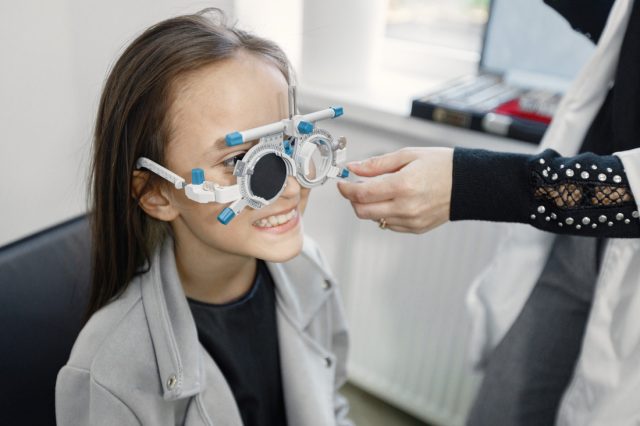One cannot emphasise more on how important children’s eye health is in contributing to their development and well-being. During their childhood years, their eyes and brain undergo a critical period of development. Therefore, it is important for every parent and guardian to keep an eye on their children’s eye health to ensure normal maturation process of their visual system.
While parents diligently keep a watchful eye on their children, the pandemic happened, causing various social disruptions, and affected many, including children, in diverse ways.

“There are data from other countries which shows that the rates of myopia, or near-sightedness, a common eyesight condition where near objects are seen clearly while distant objects look blurry, increased during the pandemic when lockdowns were implemented and schooling went virtual,” said Dr Chin Pik Kee, Sunway Medical Centre, Sunway City’s Paediatric Ophthalmologist.
“The increasing incidence of myopia among children is a growing concern worldwide. Apart from genetics, myopia is also caused by environmental factors such as urbanisation of rural communities and the modern lifestyle. These changes result in activities of living shifting indoors and increasing amount of time doing near work,” Dr Chin explained.
Myopia and the impact of Covid-19 are just a couple of the on-going concerns when it comes to children’s eye health. Other concerns include:
- Digital Eye Strain caused by digital devices and increased screen time. Among the symptoms are eye fatigue, dry eyes, eyestrain, headaches and blurred vision.
- Eye Injury caused by sharp objects, projectiles (e.g. toy guns), firecrackers, as well as bites or scratches from pets and other animals.
- Childhood obesity, which increases the risk of Type 2 diabetes and diabetic eye disease.
- Lack of awareness on the importance of regular eye screenings, which can result in the delayed diagnosis of important vision problems.
Dr Chin further shared, “Some occurrence may be unavoidable, for instance, the usage of computers or tablets for classes and homework. However, there are ways to help reduce the symptoms by instilling good habits among the children. These include looking away from the screen and into the distance every 20 minutes, remembering to blink often, sitting with a good posture and taking short breaks at regular intervals. Also, it is just sensible to reduce recreational screen time accordingly if the child already spends a lot of screen time for studies.”
On the appropriate amount of screen time, Dr Chin said, “My recommendation is for children to not start playing with digital gadgets until they reach 2 years old. After that, they may engage in screen-based activities together with their parents or carers, not alone and unsupervised. As for children below 10 years old, I suggest limiting recreational screen time to a maximum of 2 hours a day, with breaks in between.”
Dr Chin emphasised that children need time for creative play, physical activities and outdoor time, all of which are important for holistic growth and development of a child. “Studies have consistently identified outdoor time as an important factor for normal eye growth in childhood. Children who spend at least 2 hours outdoors daily are less likely to develop myopia. They also start to need glasses for myopia at an older age, if they need them at all.”
Here are more proactive steps that parents can take to maintain their children’s eye health:
- Eye screenings as this is the best way to detect vision problems. Infants and young children can seem to see normally even when they have serious eye condition. Hence, parents may not notice any concerns until at a later stage.
- Encourage outdoor activities and ensure they cut down their gadget use and screen time.
- Provide children with a healthy, balanced diet. Food rich in omega-3 fatty acids, vegetables and fruits, like carrots, leafy greens, fish, and citrus fruits, contain nutrients that support eye health.
- Education on eye safety and prevention of injuries, such as from sharp objects, projectiles (e.g., toy guns), firecrackers and bites or scratches from pets.
Dr Chin, however, cautioned that taking dietary supplements in the absence of a deficiency does not improve vision. “Excessive intake of certain vitamins may even be harmful,” she reminded.
As the eyes are our windows to the world, it is important to stay updated with the latest research and recommendations from eye care professionals. Parents should always stay vigilant for any signs of vision problems or discomfort in their children and bring them to see an eye doctor if they notice anything unusual about their child’s eyes or vision.
About Sunway Medical Centre, Sunway City
Sunway Medical Centre is the largest private quaternary hospital in Malaysia with 724 licensed beds and is committed to becoming an international healthcare institution of choice. The hospital offers a comprehensive range of medical services, which include state-of-the-art facilities and advanced medical technologies for outpatient and inpatient speciality care, health and wellness programmes and 24-hour emergency services. These are supported by a strong system comprising more than 3,300 dedicated healthcare and hospitality professionals.
Recognising the increasing sophisticated needs in healthcare, Sunway Medical Centre has developed niche areas of medical service, from the field of neurosciences to advanced cancer treatment, and from clinical research to bio-medical technology. Some of the core speciality areas include Cancer, Women and Children, Neuroscience, Heart and Lung, Bone and Joint, and Digestive Health services. Its areas of expertise also include kidney, bone marrow and cornea transplants as well as cell-based and gene-based therapies.
Sunway Medical Centre, the flagship hospital of Sunway Healthcare Group (SHG), is well recognised for an accolade of achievements. The hospital is accredited by the Australian Council on Healthcare Standards (ACHS) and Malaysian Society for Quality in Health (MSQH), and won Frost & Sullivan’s Malaysia Smart Hospital Company of the Year for two years in a row. Sunway Medical Centre is poised to set new standards of service with an exciting growth to an over 1,000 hospital beds from its current 724 beds.












